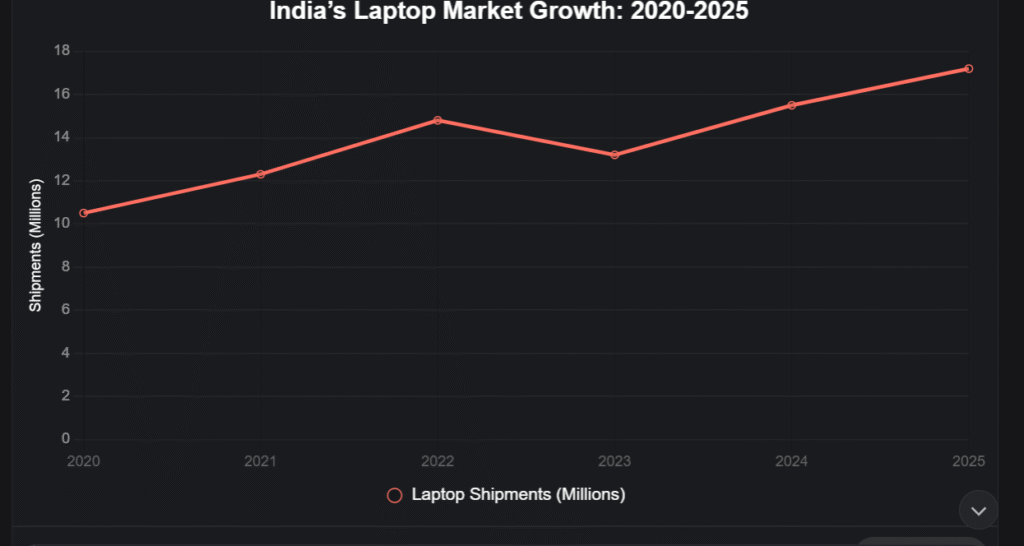In a significant leap for India’s electronics manufacturing sector, South Korean tech giant Samsung has officially launched laptop production at its Greater Noida plant, marking a bold expansion of its “Make in India” commitment. Unveiled on August 17, 2025, this development underscores a strategic pivot to diversify production beyond smartphones, tablets, and wearables, positioning India as a key hub in Samsung’s global supply chain. The move comes amid growing demand for locally manufactured tech products and aligns with the government’s push for self-reliance in advanced technology under the “Make in India” and “Atmanirbhar Bharat” initiatives.
Table of Contents
A New Chapter in India’s Tech Ecosystem
Samsung’s Greater Noida facility, operational since 1996 and one of the company’s oldest manufacturing bases in India, has long been a cornerstone of its global operations. The plant, which already produces over 120 million mobile phones annually, now adds laptops to its portfolio, including the popular Galaxy Book series. This expansion follows a high-level meeting between Union IT Minister Ashwini Vaishnaw and Samsung Southwest Asia executives, where the minister hailed the company’s role in driving innovation and talent development in India. The first batch of India-made laptops rolled out recently, signaling a promising start to this venture.
The decision to localize laptop production taps into India’s rapidly growing personal computing market, fueled by remote work, digital education, and a burgeoning startup ecosystem. With competitors like HP, Dell, and Lenovo dominating the segment, Samsung’s entry aims to challenge the status quo, leveraging cost advantages and the “Made in India” brand appeal. Initially, production will cater to domestic demand, with plans to scale up and potentially explore exports in the future.
Economic and Strategic Implications
This launch is a win for India’s economy, promising job creation and reduced reliance on imported electronics. Samsung, already India’s second-largest smartphone manufacturer and exporter, is poised to replicate its mobile success in the laptop segment. The move also strengthens India-Japan-South Korea tech collaboration, especially as Japan shifts legacy semiconductor and display production to India, creating a ripple effect in the region’s supply chains. For Samsung, it mitigates risks from global supply chain disruptions and tariffs, particularly amid U.S.-China trade tensions.
The government’s Production Linked Incentive (PLI) scheme and supportive policies have played a pivotal role, incentivizing companies like Samsung to invest in local manufacturing. This aligns with India’s goal to become a $300 billion electronics manufacturing hub by 2026, up from $75 billion currently. However, challenges remain, including infrastructure gaps and the need for skilled labor to support advanced production lines.
Data and Insights
The following table outlines the scope of Samsung’s production expansion at Greater Noida:
| Product Category | Key Models | Expected Impact |
|---|---|---|
| Smartphones | Galaxy Series | India’s second-largest exporter |
| Tablets | Galaxy Tab Series | 15% market share domestically |
| Wearables | Galaxy Watch, Buds | Growing demand in fitness tech |
| Laptops | Galaxy Book Series | Entry into competitive PC market |
Chart: India’s Laptop Market Growth (2020-2025)
The following chart illustrates the rising demand for laptops in India, providing context for Samsung’s entry:

Insight: Despite a dip in 2023 due to global economic slowdowns, the market is rebounding, with projections of 17.2 million units shipped in 2025. Samsung’s timely entry could capture a significant share, especially with localized pricing advantages.
Challenges and Opportunities
While the launch is a positive step, Samsung faces hurdles. The laptop market is highly competitive, with established players offering diverse portfolios. Additionally, India’s infrastructure, including power supply and logistics, needs upgrades to support large-scale manufacturing. On the opportunity side, government incentives and a young, tech-savvy population provide a fertile ground for growth. Samsung’s plan to manufacture more devices at Greater Noida hints at future expansions into other categories like desktops or servers.(
Looking Ahead
Samsung’s laptop production launch at Greater Noida is more than a corporate milestone—it’s a testament to India’s evolving role as a global manufacturing powerhouse. As the company scales up, it could drive down prices, making tech more accessible to Indian consumers while bolstering the nation’s export potential. With Japan’s recent moves to shift production to India and Samsung’s expanded footprint, the Indo-Pacific region is witnessing a tech renaissance. This collaboration could redefine global electronics supply chains, offering a resilient alternative to China-centric models.

also read : Startup Hubs In India: Bengaluru Vs. Hyderabad Vs. NCR Vs…
Last Updated on Friday, August 29, 2025 4:34 pm by Startup Magazine Team